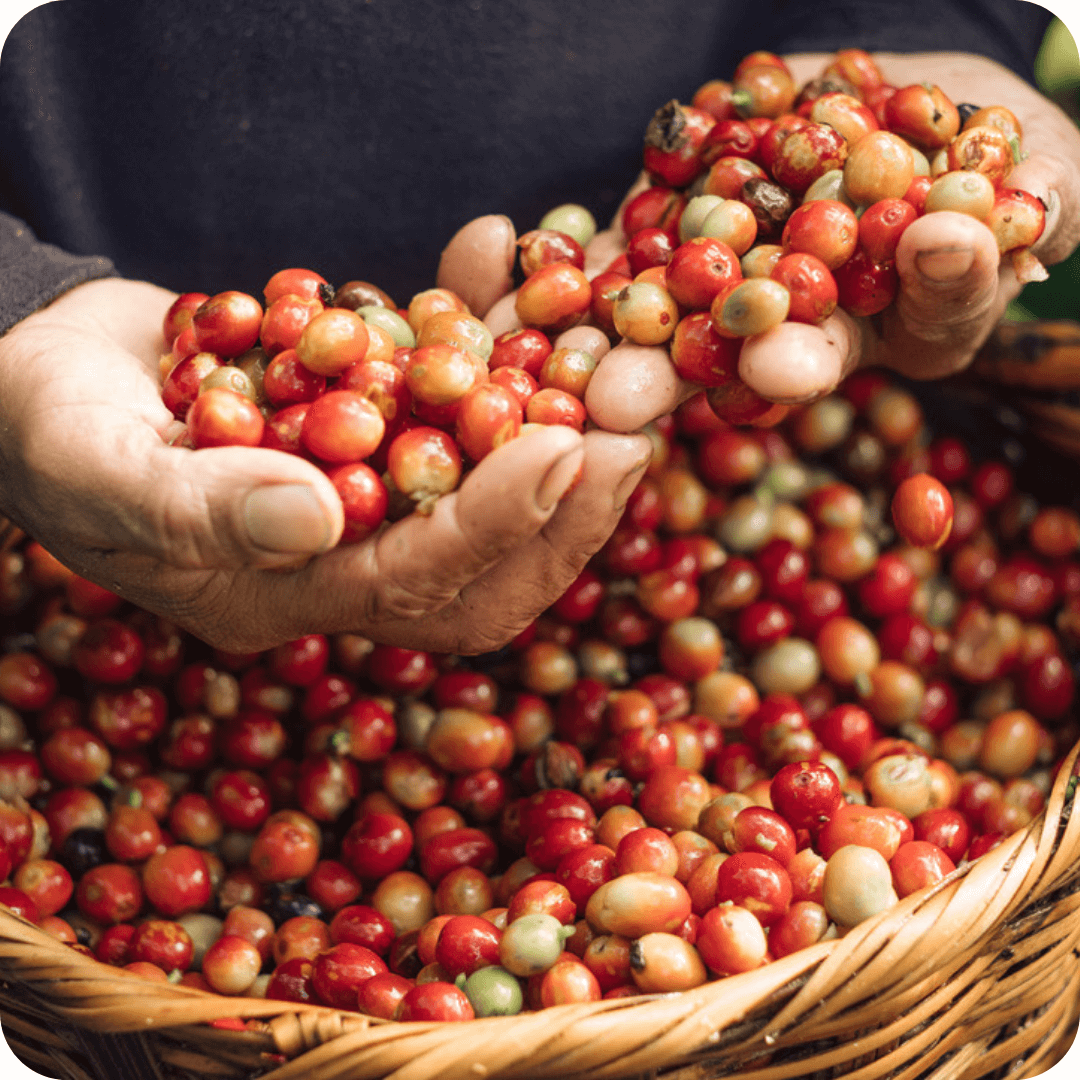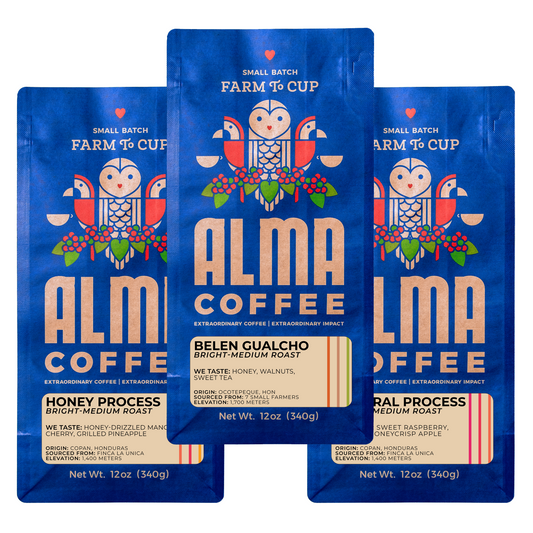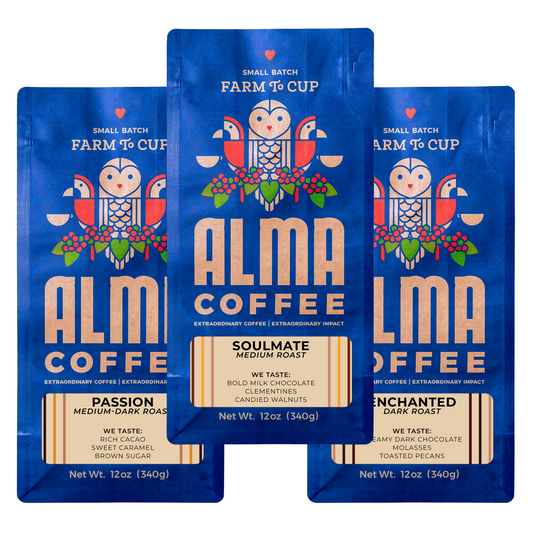
Your Morning Coffee is in Danger! Will You Help Save It?
Share
Written by: Kelley Bostian
Coffee has maintained its status as a global commodity since it first hit the world market somewhere around the 15th century; It is the most consumed beverage in the world (behind water) at 400 billion cups per year on average1. In 2010, for example, coffee was consumed daily by nearly half of all Americans on a daily basis (150 million people) and was also the second most exported commodity by developing countries2.
At this point, it’s an acceptable prediction amongst economists to argue that coffee, in both its roasted and green bean form, will continue to grow in both American and global popularity far into the future—but what if we told you the farms that give us this delicious hot beverage, the bedrock of the entire industry, are also at serious risk of collapse?
You read that right: Your Morning Coffee is actually in Danger! 🚨
From the continued growth in popularity of American coffee culture to the emergence of cool & new brewing techniques that change the way we enjoy ground beans, coffee has become part of our society’s daily way of life—and that’s partially why we need to fight to save the bottom line of this industry, including the people whose livelihoods depend on it, from preventable economic destruction!
As pointed out by our co-founder Al Lopez in a recent Tedx Talk, there are over 120 million people whose livelihoods depend on the coffee industry. For comparison, that's nearly 1/3 the size of the population of the United States, and the economic value of the entire industry is nearing $130 billion as of 20203.
However, the average price of green bean coffee has plummeted since the late 70s, falling from $2.32/lb in 1977 to $1.14/lb in December of 20204. Other popular commodities, conversely, have seen steady increases; Adjusted for inflation, gas has risen from $1.94/gal in 1977 to $2.60/gal in 2020, and the average price of a house has risen from $161,000 in 1977 to $278,621 in 20205.
Although you would expect this decrease in price to benefit the end-consumer, the opposite has occurred: roasted coffee prices have steadily increased while green bean prices have steadily decreased6. It may not seem to matter when you take a sip of your morning coffee, but this economic trend has dire consequences for the millions of individuals whose livelihoods depend on farming coffee as well as the billions who depend on the rejuvenating effects of caffeine in their morning cup of coffee.
"Although you would expect this decrease in [coffee] price to benefit the end-consumer, the opposite has occurred: roasted coffee prices have steadily increased while green bean prices have steadily decreased"
Already presented with challenges to their agricultural way of life such as climate change and deforestation, coffee farmers who, year after year, see decreased revenue from their green bean buyers may have to make very difficult and swift decisions to combat the economic disparity such as laying off workers, converting their coffee farms into different agricultural products, or even closing down the farms altogether and ending a unique way of life.
But keep reading, there’s definitely hope!
ALMA-DOPTIONS: From "Fair-Trade" to "Direct-Trade" 👨🌾☕️
The consequential economic trend of coffee's ever-decreasing value is largely the result of disparity in pricing at the green bean and consumer stages. The market incentivizes large companies that put quantity over quality in pursuit of reaching broader audiences, leaving smaller roasters and farmers at a disadvantage.
A 2012 study, which illustrates the aforementioned point, found that 45% of all coffee roasting was controlled by 4 major companies7. Large coffee companies establish long-term contracts with coffee farmers designed to keep revenue stagnant and roaster selection limited. Because of this, coffee farmers on average see a return of less than 1¢ for every dollar of roasted coffee sold8.
"[...] 45% of all coffee roasting [is] controlled by 4 major companies. Large coffee companies establish long-term contracts with coffee farmers designed to keep revenue stagnant and roaster selection limited."
The ethical repercussions of revenue disparity in the supply chain have become a hot topic throughout the entire coffee industry. You may have heard the word “fair-trade” stamped on your favorite roast or thrown around at your local coffee shop, but what does it actually mean to be certified as a “fair-trade”?
Fair-trade certification addresses problems in the coffee supply chain on a macro rather than micro level. To be certified as fair trade, coffee roasters must pay their green bean suppliers fairly based on qualifications set by FLO-CERT. These qualifications are all-encompassing in nature and not necessarily specific to individual farmers’ needs.
At Alma, we believe the solution to saving the coffee supply chain is “direct-trade,” or coffee roasters that buy green beans directly from farmers. Not only does our coffee come from our own farms, Finca Terrerito & Fincal La Unica, but we also abide by a direct-trade hybrid model called “Alma-doptions,” coined by our founders Harry & Leticia Hutchins.
"An 'Alma-doption' means partnering with a coffee farmer that we PERSONALLY know. We pay them a fair price, ignore C-Market, [...] and ensure that farmers will use their higher prices to foster sustainability in the coffee industry.
An “Alma-doption” means partnering with a coffee farmer that we PERSONALLY know. We pay them a fair price, ignore C-Market (more on what that means in a later blog post), and ensure that farmers will use their higher prices to foster sustainability in the coffee industry.
HOW CAN I HELP SAVE THE COFFEE INDUSTRY? 🤚💙
We know this blog has been somewhat doomy and gloomy, but we also have good news to offer you as well: you can help directly fix problems within the coffee industry without breaking the bank. That's right, your purchasing power can (and will) reverse the economic disparity currently plaguing coffee farmers. It all starts with ensuring the coffee you enjoy drinking is impacting the industry in a positive way!
The next time you buy a bag or cup of coffee, ask your coffee provider the following questions:
1. Do you know who roasted this coffee? ☕️
If you aren’t buying directly from a roaster like Alma, it’s important to note that direct-trade is intended to benefit the entire coffee supply chain starting with farmers and ending with roasters. If your coffee supplier can’t name of the roaster who roasted the coffee they are selling you, is it really worth the purchase? Mutually beneficial relationships between roasters and farmers results in extraordinary tasting coffee.
2. Do you know what country this comes from? 🌎
This seems like a no-brainer type of question, especially for those who pride themselves on the nuances of Arabica strands, but knowing that your coffee supplier has at least a basic understanding of their coffee’s origin will set you up perfectly for a more specific follow up question. If they can’t clearly explain where their coffee beans come from, do you really know what you’re drinking and who it impacts?
3. Do you know THE name of the coffee farmer? 👨🌾
This is a huge test of both direct-trade and fair-trade certifications. Although we believe direct-trade roasters provide more tangible benefits to their farmers’ lives, even fair-trade roasters should be aware of the farmers they are impacting by branding their coffee as ethically sustainable. If your coffee supplier can’t quickly and clearly tell you the name(s) of farmers they buy from, chances are they aren't impacting the coffee industry in a meaningful or positive way.
The industry is in dire need of positive change, will you help us make an impact in farmers' lives? 👨🌾☕️💙
Unlike other commodities, every step of the coffee supply chain is crucial in delivering a great tasting product at the end of the process. Knowing exactly where your coffee came from in its journey from farm-to-cup is crucial in determining how your purchasing decision impacted the world around you. We practice what we preach here at Alma, but also have faith that the industry at large is slowly (but surely) trending in the right direction with consumers like yourself!
Watch the direct impact your purchase of Alma Coffee makes towards improving lives here, and browse our selection of different roasts to see the difference direct-trade makes in yielding extraordinary coffee!
Sources:
1 Mussatto, Solange I., et. al. "Production, composition, and application of coffee and its industrial residues." Food and Bioprocess Technology 4, no. 5 (2011): 661.
2 Mussatto, Solange I., et. al: 661.
3 “Global Coffee Market (2020 to 2024)” Business Wire, 13 May 2020, www.businesswire.com
4 “Arabica Prices Rise in December.” International Coffee Organization - What's New, www.ico.org/.
5 https://www.bls.gov/cpi/
6 Anderson, Robert D., and Anna Mueller. "Competition policy and poverty reduction: A holistic approach." Available at SSRN 2223977 (2012).
7 Anderson, Robert D., and Anna Mueller. (2012). Cont'd.
8 Anderson, Robert D., and Anna Mueller. (2012). Cont'd.






53 comments
Hello everyone, my name is Edwin Dicine. Am from Los Angeles California. I want to introduce a good testimonies of Dr Kachi the great lottery spell caster who helped me to win a lottery..my story on how I win million After reading about a article who Dr Kachi helped, I got in contact with Dr.Kachi and he told me that he going to help me cast a spell that will profit me when I play the Powerball game, and i do believed him and took action. After he casted the winning number spell, I played the Powerball Ticket, and i won greatly which I did today I’m here shearing a testimony about this same man Dr Kachi help me to win $45 million dollars, I am so happy for meeting this great spell caster that has changed my life, You can also contact Dr Kachi the legend spell caster to help you cast a lottery spell and win too, he might be of help to anyone who is interested. contact: drkachispellcast@gmail.com his Text Number and Call: +1 (209) 893-8075 his Website: https://drkachispellcaster.wixsite.com/my-site
Thank you for sharing this and spreading awareness. After reading this blog I’m glad that I buy my filter coffee powder from a reliable source.
We will continue to help support the coffee farmers by purchasing Alma coffee.